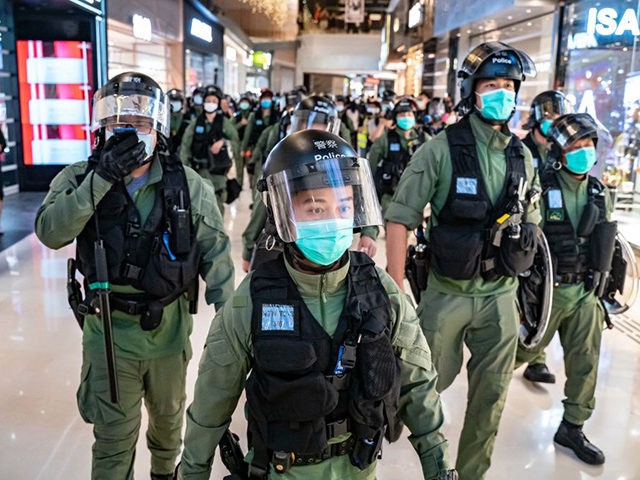Hong Kong police seek to arrest six pro-democracy activists for allegedly “inciting secession and colluding with foreign powers,” according to Chinese state media.
None of the six targets currently live in Hong Kong. One of them is Samuel Chu, an American citizen who runs a group called the Hong Kong Democracy Council based in Washington, D.C.
“Hong Kong police are targeting a U.S. citizen for lobbying my own government. I might be the first non-Chinese citizen to be targeted, but I will not be the last,” Chu warned.
“If I am targeted, any American, any citizen of any nation who speaks out for Hong Kong can — and will — be too,” he said.
Chu noted that he has been charged with “colluding with a foreign power” even though he has been an American citizen for 25 years. One of Chu’s correspondents on Twitter pointed out that the Hong Kong security law explicitly asserts that it can be used against “non-permanent residents who breach this law outside of Hong Kong territory.”
Chu told Voice of America News (VOA) that Hong Kong’s Beijing-controlled government is trying to “create fear,” not just in Hong Kong but around the world. He described himself as a “test case” for using the national security law against foreign citizens, and for intimidating Chinese subjects out of communicating with foreigners who challenge the regime.
“Millions of people are now understanding that if they can go after us, they can come after anybody,” he said.
Chu predicted Beijing’s heavy-handed actions would backfire by “provoking and inviting foreign response every time they use the law.”
“The most egregious danger they have is the national security law because they’re inviting all kinds of actions against themselves. They are inviting the U.S. to step up response, both politically and policy-wise,” he said.
“Others wanted by Hong Kong police include prominent democracy activist Nathan Law, who recently fled the city for Britain, and Simon Cheng, a former British consulate staffer who was granted asylum in the UK after allegedly being tortured in China,” the Hong Kong Free Press (HKFP) reported.
Nathan Law responded by saying the arrest of four students under the security law, the disqualification of a dozen pro-democracy candidates from the 2020 legislative elections (which have now been suspended entirely), and the arrest warrants for activists living outside of China’s borders are “indications of our need to remain active on the global stage.”
“That Hong Kong has no place for even such moderate views like ours underscores the absurdity of Chinese Communist rule,” he said.
Simon Cheng, then a citizen of Hong Kong, was arrested in August 2019 while on a business trip to China. He was charged with inciting unrest by supporting the Hong Kong protest movement. He was granted asylum in June after testifying he was beaten, blindfolded, and forced into stress positions while in Chinese custody, and compelled to record a videotaped confession to soliciting prostitutes. The British government said China never provided an “adequate response” to its questions about how Cheng was treated.
Another of the targeted activists, Ray Wong Toi-yeung, is currently in the United Kingdom. He told Reuters in an interview the arrest warrants were a sign of desperation by the Chinese government.
“I think they want to cut off our connection with people in Hong Kong,” he said. “It will make people fear that they may violate the national security law.”
Reuters also spoke with a fourth target of the arrest warrants, Wayne Chan Ka-kui, from an “undisclosed country.”
“For me, the situation faced by Hong Kongers is even more dangerous than what I face. I can’t think too much about my personal safety,” Chan said.
None of the targeted activists were willing to let Beijing silence them.
“I would not stop what I’m doing,” vowed Chu. “They are not going to scare me into hiding, and they’re not going to erase me from being able to speak out.”
Chinese University of Hong Kong professor Willy Lam told VOA that China’s top priority is cutting dissidents off from foreign support. Lam said the round of arrest warrants for dissidents living outside of China was intended as a means of taking them hostage and warning foreign governments not to “interfere in Hong Kong affairs,” or else they might “harm activists like Nathan Law.”
“China is very determined and is acting quickly. More people will be arrested in the near term. They will further silence and stop intellectuals and journalists from expressing opinions and target democracy activists,” Lam predicted.

COMMENTS
Please let us know if you're having issues with commenting.